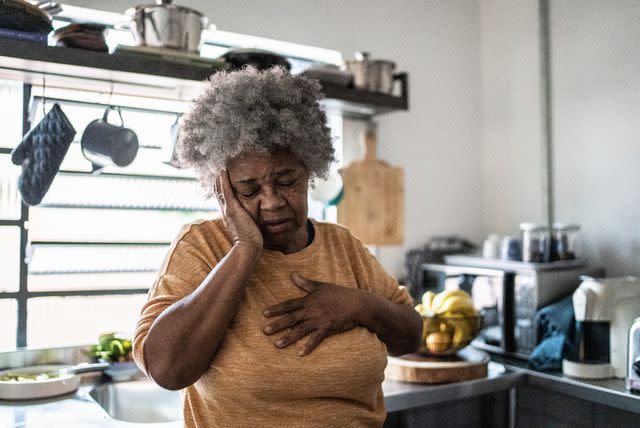Mini Heart Attack: Don’t Doubt Yourself With Suspected Symptoms
Medically reviewed by Jeffrey S. Lander, MD
A silent or "mini" heart attack occurs without the classic symptoms of chest pain or pressure, sudden shortness of breath, dizziness, or sweating. Research estimates that between 20% and 50% of all heart attacks are silent heart attacks. Subtle and unexplained symptoms such as fatigue, general discomfort, indigestion, and chest pain may indicate this condition and warrant a 911 call.
This article describes various mini heart attack symptoms and offers guidance for when to seek medical attention.

FG Trade / Getty Images
Subtle Mini Heart Attack Symptoms: How to Tell
A silent heart attack often occurs without typical heart attack symptoms. Often, the symptoms of a silent heart attack are mild and brief, so they are confused for those of another problem or ignored. Seek urgent medical evaluation if you experience any of the following symptoms:
General physical discomfort
Indigestion
Nausea or dizziness
Sudden light sweating
Flu-like symptoms
Weakness or fatigue you might otherwise attribute to stress or overexertion
Discomfort in the center of the chest, arms, back, neck, or jaw, which might mimic the feeling of a pulled muscle
Like a heart attack, a mini heart attack disrupts blood flow and causes scarring and damage to the heart, which is why you should take these symptoms seriously. The only way to know for sure that you're experiencing a mini heart attack is to go to the hospital for testing and diagnosis.
Different Types of Heart Attacks
There are different classifications of chest pain related to heart attacks: ST-elevation myocardial infarction (STEMI), non-ST elevation myocardial infarction (NSTEMI) and angina:
STEMI: ST-elevation refers to changes in the heart's electrical conduction as noted on an electrocardiogram (EKG). A STEMI occurs when one or more heart arteries are blocked.
NSTEMI: An NSTEMI occurs when one or more of the heart's arteries are partially blocked, causing a significant reduction in blood flow.
Angina: There are two types of angina: stable and unstable. Stable angina occurs when the heart's muscle requires more oxygen, such as during stress or physical activity. Unstable angina occurs at rest, even when sleeping, and can lead to a heart attack. If you experience chest pain at rest, you should seek emergency medical attention.
Complications From Untreated Mini Heart Attack Symptoms
A heart attack, whether silent or not, can damage the heart. Other silent heart attack complications can include:
Scarring of the heart muscles
Increased risk of a more severe heart attack
As much as three times higher risk of dying from coronary artery disease
Understanding Your Risk
The risk factors for a mini heart attack mimic risk factors for cardiovascular (heart) disease in general. Certain health conditions, behaviors, family history, and advanced age can all contribute to your risk.
Health conditions: High blood pressure, high cholesterol, diabetes, and obesity
Behaviors: Eating a diet high in saturated and trans fats, not exercising enough, consuming too much alcohol, and using tobacco
Family history: Certain genetics can predispose you to heart disease; lifestyle choices passed down through generations (e.g., diet patterns, tobacco use, etc.) can also contribute to heart disease risk
Advanced age: Heart disease risk increases with age
Understanding your risk factors can help you to be more in tune with your body and recognize the symptoms of a mini heart attack that might otherwise go unnoticed.
Call 911 or Go to a Hospital
If you have risk factors and experience any of the symptoms of a silent heart attack, seeing a healthcare provider as quickly as possible is vital. The sooner you seek emergency medical care, the faster medical treatment can begin, minimizing damage to the heart. In these situations, calling 911 can quickly bring qualified healthcare providers to you to initiate medical treatment immediately.
Summary
A silent, or "mini," heart attack is a heart attack that shows minimal symptoms or no recognizable symptoms at all. Silent heart attacks can affect the heart in the same way a "regular" heart attack can, so seeking immediate medical attention to minimize heart damage is essential. If you have risk factors for a heart attack and experience any of the unexplained symptoms discussed, call 911 for emergent medical care to reduce any potential damage to the heart.
Read the original article on Verywell Health.

